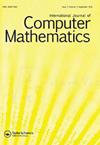A two-grid virtual element method for nonlinear variable-order time-fractional diffusion equation on polygonal meshes
IF 1.3
4区 数学
Q2 MATHEMATICS, APPLIED
International Journal of Computer Mathematics
Pub Date : 2023-10-03
DOI:10.1080/00207160.2023.2263589
引用次数: 0
Abstract
AbstractIn this paper, we develop a two-grid virtual element method for nonlinear variable-order time-fractional diffusion equation on polygonal meshes. The L1 graded mesh scheme is considered in the time direction, and the VEM is used to approximate spatial direction. The two-grid virtual element algorithm reduces the solution of the nonlinear time fractional problem on a fine grid to one linear equation on the same fine grid and an original nonlinear problem on a much coarser grid. As a result, our algorithm not only saves total computational cost, but also maintains the optimal accuracy. Optimal L2 error estimates are analysed in detail for both the VEM scheme and the corresponding two-grid VEM scheme. Finally, numerical experiments presented confirm the theoretical findings.Keywords: Virtual element methodnonlinearvariable-order fractional equationtwo-gridpolygonal meshesa priori error estimateMathematics subject classifications: 65M6065N3034K3765M1565M55 Disclosure statementNo potential conflict of interest was reported by the author(s).Additional informationFundingThis work is supported by the State Key Program of National Natural Science Foundation of China [grant number 11931003] and National Natural Science Foundation of China [grant number 41974133], Hunan Provincial Innovation Foundation for Postgraduate, China [grant number XDCX2021B098], Postgraduate Scientific Research Innovation Project of Hunan Province [grant number CX20210597].多边形网格上非线性变阶时间分数扩散方程的两网格虚元法
摘要本文建立了一种求解多边形网格上非线性变阶时间分数扩散方程的双网格虚元法。在时间方向上考虑L1梯度网格格式,在空间方向上采用VEM近似。双网格虚元算法将细网格上的非线性时间分数问题的解简化为在同一细网格上的一个线性方程和在更粗网格上的一个原始非线性问题的解。因此,我们的算法不仅节省了总计算成本,而且保持了最优的精度。详细分析了该方案和相应的双网格方案的最优L2误差估计。最后,通过数值实验验证了理论结果。关键词:虚元法非线性变阶分数方程双网格多边形网格先验误差估计数学学科分类:65M6065N3034K3765M1565M55披露声明作者未报告潜在利益冲突。基金资助:国家自然科学基金国家重点项目[批准号:11931003]、国家自然科学基金[批准号:41974133]、湖南省研究生创新基金[批准号:XDCX2021B098]、湖南省研究生科研创新项目[批准号:CX20210597]。
本文章由计算机程序翻译,如有差异,请以英文原文为准。
求助全文
约1分钟内获得全文
求助全文
来源期刊
CiteScore
3.60
自引率
0.00%
发文量
72
审稿时长
5 months
期刊介绍:
International Journal of Computer Mathematics (IJCM) is a world-leading journal serving the community of researchers in numerical analysis and scientific computing from academia to industry. IJCM publishes original research papers of high scientific value in fields of computational mathematics with profound applications to science and engineering.
IJCM welcomes papers on the analysis and applications of innovative computational strategies as well as those with rigorous explorations of cutting-edge techniques and concerns in computational mathematics. Topics IJCM considers include:
• Numerical solutions of systems of partial differential equations
• Numerical solution of systems or of multi-dimensional partial differential equations
• Theory and computations of nonlocal modelling and fractional partial differential equations
• Novel multi-scale modelling and computational strategies
• Parallel computations
• Numerical optimization and controls
• Imaging algorithms and vision configurations
• Computational stochastic processes and inverse problems
• Stochastic partial differential equations, Monte Carlo simulations and uncertainty quantification
• Computational finance and applications
• Highly vibrant and robust algorithms, and applications in modern industries, including but not limited to multi-physics, economics and biomedicine.
Papers discussing only variations or combinations of existing methods without significant new computational properties or analysis are not of interest to IJCM.
Please note that research in the development of computer systems and theory of computing are not suitable for submission to IJCM. Please instead consider International Journal of Computer Mathematics: Computer Systems Theory (IJCM: CST) for your manuscript. Please note that any papers submitted relating to these fields will be transferred to IJCM:CST. Please ensure you submit your paper to the correct journal to save time reviewing and processing your work.
Papers developed from Conference Proceedings
Please note that papers developed from conference proceedings or previously published work must contain at least 40% new material and significantly extend or improve upon earlier research in order to be considered for IJCM.

 求助内容:
求助内容: 应助结果提醒方式:
应助结果提醒方式:


